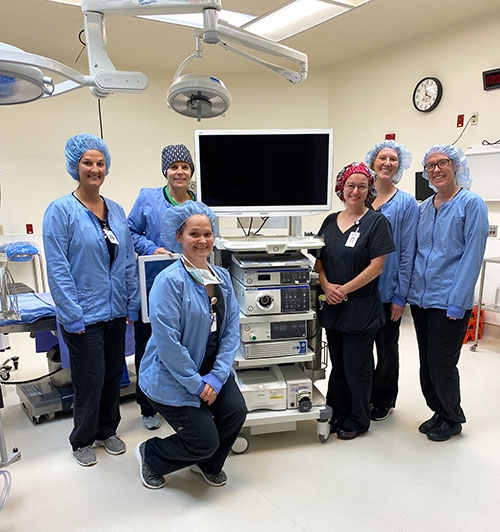You are here
Home ›March is Colorectal Cancer Awareness Month: Prevent colon cancer with colonoscopies; Now starting at age 45

Colonoscopies available at Veterans Memorial Hospital ... Preventing Colon Cancer with Colonoscopies-Now Starting at age 45. March is Colorectal Cancer Awareness Month. Colon cancer can be easily prevented, yet it remains the third leading cause of cancer deaths in the United States. Colonoscopies, a very thorough colon cancer test, are performed routinely in the Veterans Memorial Hospital surgical suite. Pictured above is the camera tower used during colonoscopy procedures along with some of the hospital surgery staff who help patients prepare and recover from this common, life-saving procedure. Submitted photo.
Colorectal cancer can be easily detected, yet it remains the third leading cause of cancer in the United States. According to the American Cancer Society, one in 24 Americans will be diagnosed with colorectal cancer in their lifetime. Unfortunately, only about one in three persons in the U.S. age 45 and over gets the recommended screening.
Colon cancer screening tests identify suspicious or pre-cancerous polyps, which can be removed before they develop into a serious health problem. There are four main testing options for detecting colon cancer: Fecal Occult blood test, Flexible Sigmoidoscopy, Barium Enema and Colonoscopy.
Colonoscopies, a very thorough colon cancer test, are performed routinely in the Veterans Memorial Hospital surgical suite with the equipment pictured at left, and typically take just three hours from start to finish.
The recommended age for having the first screening colonoscopy is now 45, instead of age 50 as in previous years. According to the American Cancer Society, 13 percent of all diagnosed colon cancers are among people under age 50 - representing a nine-percent increase in cases in this age group since 2020.
Both men and women are at risk for colon cancer. Factors associated with increased risk for colon cancer include:
• Age - most diagnosed are 45 or older
• Race - African Americans are at greater risk
• Personal or family history of colon cancer
• Personal or family history of intestinal polyps
• Personal history of inflammatory bowel disease (ulcerative or Crohn’s colitis)
• Certain genetic factors (familial adenomatous polyposis, Gardner’s syndrome, hereditary nonpolyposis colorectal cancer, Ashkenazi Jewish descent)
• Smoking or use of other tobacco products
• Physical inactivity
• Diets high in red meat.
The benefit to having a colonoscopy is to find colorectal cancer early when it’s still small. During a colonoscopy, polyps (questionable tissue growths) are removed before they have a chance to turn into cancer.
Preventing colon cancer altogether through testing is the ideal outcome, but early detection of the disease also yields significant survival rates. Nationally, people whose colon cancers are found at an early stage through testing have five-year survival rates of 90%. However, only 37% of colon cancers are detected in the earliest stages. Of those whose cancers are found at late stage, the five-year survival rate is less than 10%.
Colorectal cancer might not cause symptoms right away, but if it does, it may cause one or more of these symptoms:
• A change in bowel habits, such as diarrhea, constipation, or narrowing of the stool, that lasts for more than a few days
• A feeling that you need to have a bowel movement that’s not relieved by having one
• Rectal bleeding with bright red blood
• Blood in the stool, which may make the stool look dark
• Cramping or abdominal (belly) pain
• Weakness and fatigue
• Unintended weight loss.
If you have questions concerning your own health and risk of colon disease, be sure to seek advice from your local family practice provider.

